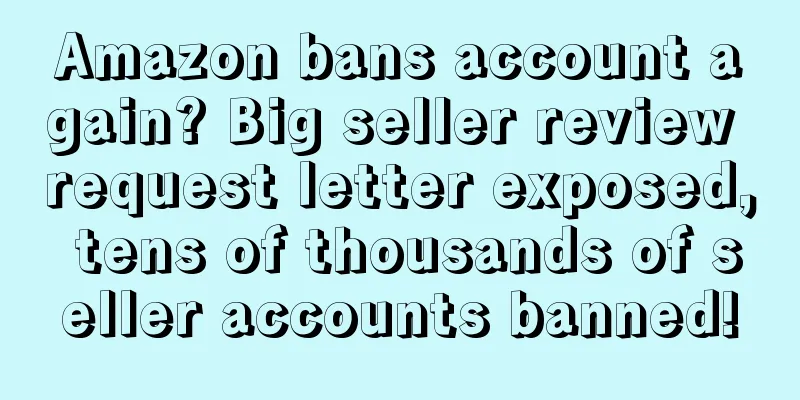At the end of April 2021, the brand store of Paton, a big seller on Amazon, was blocked, becoming the first domino to fall. Since then, Amazon's account blocking wave has suddenly hit, affecting more than 3,000 seller accounts and about 600 Chinese brands have been closed, causing panic in the cross-border circle.
Days come and go, years pass. Time has turned to 2022. While cross-border sellers have not yet recovered from the aftereffects of the account suspension wave, Amazon is still sharpening its knife to crack down on violations. Recently, Amazon has once again launched a wave of account suspensions on its Pakistan site, which was just launched last year. Tens of thousands of sellers’ accounts have been blocked due to violating the rules! It is learned that on May 21, 2021, Amazon officially opened its third-party platform to Pakistani sellers to sell their products. According to the MarketplacePulse report, Pakistan has become the second largest seller country after China, occupying an important position among Amazon's third-party sellers. But recently, Amazon banned more than 13,500 Pakistani seller accounts because these sellers were suspected of unfair competition and engaged in various fraudulent activities. It is learned that these blocked sellers are mainly from the two major cities of MianChannu and Sahiwal in Pakistan. Currently, Amazon has marked these two areas as "fraud red zones" and blocked the IP addresses in these areas. There are four main reasons why these sellers were banned : 1. Fake tracking (Kabootar) According to regulations, Amazon will credit the funds to the seller's account within 14 days. To this end, these illegal sellers will provide an estimated delivery time of 10 to 15 days, and after the buyer purchases the product, they will provide false product logistics information to the buyer, but will not actually ship the product, and will receive the funds from Amazon on the 14th day. Amazon sellers in Pakistan have reportedly made thousands of dollars using this tactic. After these sellers get orders on Amazon, they create secondary accounts at Sam's Club, Walmart or other websites, use the buyer's delivery address to purchase the goods and ship them to the actual buyer. This model is called the "resale arbitrage" model. While disrupting Amazon's sales order, it will also cause huge losses to the original brand. 3. Hacked Prepaid Cards (Carding) These sellers buy hacked prepaid cards from the dark web for $100 to $200. These hacked cards come with all the necessary information like card number, expiration date, and Card Verification Value (CVV). Sellers use these cards to buy and resell prepaid gift cards to buyers, avoiding detection. These sellers use the public information of companies registered in the United States to register stores on Amazon, and then create Amazon Business Prime buyer accounts in their own names to purchase goods for other Amazon buyers who place orders. Since Amazon offers a 30- day free trial for Amazon Business Prime , after creating a Business Prime account in the name of the CEO of a U.S.-registered company, sellers can use the company’s EIN to exempt purchases from sales tax. The seller will cancel the account 29 days before the tax deduction deadline and re-register another account following the same steps. By the end of the year, the US company with the registered information will bear all taxes, and there will be no impact on the seller.
Due to the above-mentioned violations, more than 13,500 Pakistani seller accounts have been banned by Amazon. The wide scope of involvement reminds sellers of the Amazon account ban wave that affected a large number of Chinese sellers last year. However, unlike Pakistani sellers, the reasons for the banning of Chinese sellers’ accounts are more related to fake reviews . Among them, the review request letter from Shenzhen sellers, which was named by the Wall Street Journal last year for using gift cards to request reviews, was considered one of the important triggers for the ban wave last year. We learned that a few days ago, someone exposed a review letter from a Shenzhen big seller on overseas social media. A Shenzhen seller’s letter requesting reviews was exposed, suspected of manipulating reviews! It is learned that in the exposed letter requesting reviews, the Shenzhen seller wrote: "Send screenshots of orders and reviews to the designated email address, and you can redeem a $20 gift card. The gift card will be sent to the email address within 48 hours after the review takes effect..." Although the seller did not mention any words like "good reviews" or "five stars" in the letter, the content of the letter is almost identical to the review-seeking letter from a big seller that was named by the Wall Street Journal last year for using gift cards to solicit reviews and was considered one of the important triggers of last year's account closure wave. Cross-border navigation , like 30 ▲ Video account focuses on cross-border navigation Therefore, once the letter requesting reviews was exposed, it attracted great attention from external online sellers. The vast majority of sellers believe that this behavior is suspected of creating false reviews. Some sellers said they would report this behavior to foreign media reporters. In this regard, we learned that as early as last year when it solemnly declared severe punishment for false reviews, Amazon had already regarded the seizure of gift cards as a key part of its cleanup plan. Considering that the review request letter last year may have been the trigger for the account suspension wave, and Amazon has been stepping up its efforts to crack down on fake reviews, we would like to remind all sellers to conduct a comprehensive check on the compliance status of their accounts in the near future to avoid being implicated if the incident further expands its influence on overseas social media. Those who are good at building can do it, and those who comply with the regulations will win. At present, fake reviews have become a sensitive nerve in Amazon's compliance process. Once touched, it will be considered a violation of the regulations. In this situation, white hat tactics have become the mainstream in the circle, and sellers need more long-term deep cultivation and patient accumulation to find the key points for performance breakthroughs. What do you think about this? Welcome to discuss in the comment area~ |










